If you often feel anxious and embarrassed, this guide is for you. It will give you the tools you need to be more relaxed in social settings, get out of your head and into the conversation.
This guide is for anyone who’s feeling overly self-aware, but examples are geared toward adults in work or at college.
Note: Sometimes, the underlying reason for self-consciousness is social anxiety. If this is the case for you, here’s our list of the best books on social anxiety.
Let’s get started!
1. Focus on someone or something
Self-consciousness comes from being overly concerned with how people see us. We worry that we won’t be seen as smart, attractive, or that others are judging us.
It can be exhausting, and with too little evidence to support the argument in either direction, we go straight to the most negative conclusion.
To get out of this pessimistic mindset, try shifting your attention to the people around you and your environment.
Focus not on what others think of you but on learning about the people you’re with. Make it a point to find out one thing about every person you meet. It could be their job, their major, or what they did on the weekend.
The objective is to get out of your head. Put that energy into the people around you rather than into feeding an inner dialogue that’s holding you back.
2. Question your inner critical voice
It’s easy to believe the negative voice inside our head is always right. But have you tried questioning it? You might find out that it has little to do with what’s real.
Check the evidence from your life:
Can you recall a time you did something that proves your inner critic wrong? For example, if your voice says, “I always mess up around people,” remind yourself of a time when you did just fine.
Ask yourself if what you are feeling is reasonable. Or, are you letting a perception you think others have of you, run the story in your head?
3. Know that people notice you less than you think
In an experiment, students were asked to wear an embarrassing t-shirt.
By the end of the day, the students who wore the shirts estimated that 46% of the class had noticed. When polled, only 23% of their mates actually had.[1] In other words, their embarrassing t-shirt was only half as noticeable as they had thought.
What feels mortifying to us is usually having little to no impact on others. People are caught up in their own thoughts and struggles, too busy to worry about ours. The best thing we can do is remind ourselves that no one cares as much as we do, and even our own filter is not a perfect lens.
4. Know that it’s OK to say some stupid things
I remember talking to a girl I was crushing on when I was in high school. She was talking about how her brother liked a band, and like a crazy person, I said, “Ya, I know.” Like somehow, I knew what group her brother liked. My crush looked at me strangely but kept going.
Did it make any difference to my crush? Not really. At this point, I can laugh about it, but at the time it felt humiliating.
Try turning the tables on the situation. Would you care if someone blurted out something silly? Or would it just pass you by without giving it extra thought? It’s better to talk freely even if you say something stupid every once in a while. The alternative is to always guard yourself, and that can make you come off as stiff and aloof.
5. Don’t try to fight your feelings
Emotions tend to cling harder when we fight them and weaken when we accept them.[2]
When you are anxious, and feeling uncomfortable in a social setting, what are you thinking about? How does thinking about that make you feel? Happy, sad, nervous, jealous? What’s your body doing when you’re in your head and feeling awkward at a party? Are you sweating, jumpy, yawning a lot (a reaction to nerves)?
Simply accept how you feel rather than trying to change it.
Now focus outward. Talk to someone. Ask them how they’re doing. What brings them to this party/event? Do they know anyone? Then check your head. How do you feel when you’re talking to someone? Do you get any less nervous as the conversation goes on? If you were blushing, has it subsided yet?
Practice going back and forth between your inner thoughts and how you feel when you are talking to others. See if you feel better when you’re in your head, listening to your internal dialogue, or when you’re spending your energy on others.
6. Focus on your positive traits
This isn’t “think happy thoughts, and you’ll be fine.” Instead, you want to base your self-worth on your real, positive qualities rather than cynical and questionable self-talk. This is what we know is true:
- You have talents and abilities that give you fundamental value.
- This combination of characteristics makes you unique and memorable.
- You are worth spending time with and knowing.
Try to list your concrete skills like your mathematical ability, you’re a good writer, you’re multilingual, you’re a great cook. Then there are your personality traits. You’re kind, honest, genuine, funny, enthusiastic, etc.
Even if you can’t make a full list today, write one positive quality down every day and then review the list every week. When you have a comprehensive list, read it every day. You’re training your mind to focus on what you do well and to be able to access it quickly.
7. Make sure you’re reading the situation right
Negative experiences can teach us to be on guard and defend ourselves from criticism and hurt. This can affect how we perceive the world and the people we encounter.
Those of us who are overly self-conscious might believe the world will judge us harshly because that is what we’ve experienced. However, as I’ve pointed out, people don’t care that much about how we act or what we say. Every new person you meet thinks of you as a blank slate.
When you’re in a scary social situation, ask yourself, “Is there a chance my past experience is affecting how I’m seeing this interaction? Is there another, more realistic way I can approach his conversation?”
Believe people will be friendly, and most of the time, they will be. If not, it says more about them than you.
8. See yourself as a social observer
People watching is fascinating, and it shows us how our basic humanity makes us all messy, foolish, and funny. Go to the mall, grab a coffee/tea, and watch people walk with their friends. Listen in as they sit beside you and talk, or as they chase their kids down the hall.
Now notice their body language, their tone of voice, and eavesdrop on what they’re saying. What we’re doing is training you to switch your focus from yourself to others and to think objectively about what you’re witnessing.
Are people relaxed or stilted? Is their posture good, or are they slouching? When they talk, are they quiet, or does the volume go up and down with excitement? The more we see others being their imperfect selves, the more we’ll realize this is what ‘normal’ looks like.
Go into this observer mode when you walk into a room of strangers. It can help you be less self-conscious.
9. Assume that people will like you
This one is about the mechanics of being seen as confident rather than inhibited or self-conscious. When we feel uncomfortable, it can make us talk softer, hug our bodies with our arms, and speak faster to get the words out and move the focus off us as soon as possible. It can make us seem aloof, and even if we don’t intend to, it makes us less approachable.
Be confident and friendly right off the bat. Walk up to people with a warm smile and present yourself. If you’re uncertain about the details, look at how likable, confident people do it and learn from them. Assuming people will like you is a self-fulfilling prophecy. Assuming they won’t is, too.
10. Ask about others to take the focus off you
It’s easier to focus on someone else other than ourselves. When you meet someone for the first time, ask them what they do for fun. What are their hobbies, or do they have any pets? Listen carefully, nod, and give them signs that you are enjoying their story. Then add anything relevant that applies from your life. Things like your pets – what kind are they, their name, breed…or your hobbies. At the end of the day, you want to have a balance between learning about them and sharing about yourself.
The goal is to learn about someone else because it’s hard to be self-conscious when you’re focused on getting to know another’s interests and stories.
11. Make internal progress checks, not comparisons
Jealousy is a miserable emotion. It makes you feel small and worthless and sucks the joy out of everything. It’s like anger directed at someone else, but you are the one who feels crappy.
Avoid both overexaggerating someone else’s talents or trying to find flaws in them to make yourself feel better. No one is perfect, and tearing them down when you feel envious just retains the focus on you because you are still comparing yourself to someone else.
Here’s a thought: What if we were OK with the fact that someone is more accomplished than us? When we accept this, it helps us see ourselves differently.
Our value then has nothing to do with how successful we are or how good we are at something. We want to go from “I like myself because I’m good at…” to “I like myself.” (Period.) This makes our self-acceptance unconditional.
How do we accept that others are more accomplished than us and be OK with that? First, let that fact sink in, and allow all your emotions of envy and sadness to come to you. Accept those emotions rather than fight them. Now, you no longer need to fear them. Afterward, you will be less prone to comparisons.
Here’s another way to do it:
Instead of thinking, “Well, at least I’m better than them when it comes to X.” Say, “I’m not good at everything, which is OK because my value isn’t based on my achievements. I have value because I am 100% myself”.
Let’s talk more about how to be more self-accepting…
12. Practice accepting yourself
Self-acceptance is one of the biggest steps we take towards achieving self-confidence.
According to Aaron Karmin, MA, LCPC, a psychotherapist in Chicago, Ill, a person “who accepts [themselves] unconditionally as a worthwhile human in spite of [their] faults and imperfections does not experience the stress of self-consciousness.”.[3]
Here are some things you can do to accept yourself:
- Decide how you are going to live your life. Will you let others define your personal image, your strengths, and your weaknesses? Try to move from blame, doubt, and shame to tolerance, acceptance, and trust.
- Make a list of all your good points.
- What do you do well?
- What are you proud of accomplishing?
- Whose lives have you made better?
- Connections you’ve made with others.
- Hardships you have overcome.
Review the list often, so you see your progress and acknowledge your gifts.
- Take an inventory of the people close to you.
- Are they good for you?
- Do they reinforce negative self-talk?
- Do they criticize or demean you?
Consider eliminating all the negative influences in your life.
- Surround yourself with a positive support group of people who celebrate you.
- Forgive yourself. If you made a mistake, realize you did your best with the information you had at the time, or you simply made a bad choice. But now you chose to move on and forgive yourself.
- Silence your inner critic. Just because it’s hard to hear doesn’t mean it’s right or 100% true. If you wouldn’t talk to someone else like you speak to yourself, why is it OK to do it to you? You’re human like everyone else. Treat yourself as well as you treat anyone else, if not better.
- Move on from your unrealized dreams. You can’t change the past. All you can do is move forward and continue to pursue your current goals.
- Help yourself see how you make others’ lives better. It’s harder to see yourself in a harsh light when you acknowledge all the good you do.
- Let it go – You can’t control everything. It’s not resignation. It’s a realization that your energy is better spent elsewhere instead of railing against the things you can’t change.
- Try to solve your problems one at a time. First, step outside your head where all the worry and self-doubt resides. Take a dispassionate look at what you need to do to move past each issue. You could even try imagining that the problems you’re facing are someone else’s (if that helps you get away from your internal thoughts). Ask yourself what advice you’d give them (yourself) to help?
- Practice Self-compassion – accept your flaws and love yourself anyway. Simple words, but for most of us, it takes years, if not a lifetime to master this step. The more you do it, the better you’ll get in every respect.
- Even though you may not have much experience being kind and compassionate with yourself, you will start to believe these good things you’re telling yourself. Especially if you keep this positive internal monologue up. In many instances, it took years to get to this place of insecurity. It will likely take weeks and months to see progress and make permanent changes to your mental habits.
13. Practice thinking about other’s needs
Try doing thoughtful things for others. Consider their struggles, worries, dreams or regrets. When you do, you take the focus off yourself and you’ll connect with them. This will help you be less self-conscious.[4] It will also show others that you are caring, and you value them. Done selflessly, it will bring good things back to you.
Here are some suggestions:
- Smiling at someone after you meet them. It could be a friend, family member, or acquaintance. Let the smile happen as you talk to them, so they know you are smiling just for them because it grows after you say, ‘Hi.’
- Hold a door for someone.
- Give a spontaneous compliment.
- Bring a friend or co-worker cookies or a pre-made dinner if they are sick or need a pick-me-up.
- Pay it forward. Pay for the coffee or drive-thru meal of the people behind you.
- Keep your area tidy and organized if you work in an open-concept office.
- Send cards for different occasions or for no occasion at all.
- Give someone 100% of your attention and note what they say so you can follow up later. (Ask them how ‘it’ went. Make sure they are OK afterward.)
- Consciously spend a few minutes every day thinking of the things you are grateful for.
A word of caution: Do not do these things to gain others’ approval. That puts the focus back on you. Do it out of sincere consideration for others. The purpose of the exercise is to focus on others and their well-being. When you do, you’ll become more compassionate and less self-conscious.
14. Consider talking to a Therapist
If your self-consciousness is inhibiting you or is a result of social anxiety, a therapist can be helpful. Having social anxiety is more common than we think, and deciding to understand and address the effect it has on your life is brave. A Psychologist or a Therapist will help you talk through your feelings, find out where they originate from, and give you the tools to unpack them and move forward.
We recommend BetterHelp for online therapy, since they offer unlimited messaging and a weekly session, and are cheaper than going to a therapist's office.
Their plans start at $64 per week. If you use this link, you get 20% off your first month at BetterHelp + a $50 coupon valid for any SocialSelf course: Click here to learn more about BetterHelp.
(To receive your $50 SocialSelf coupon, sign up with our link. Then, email BetterHelp’s order confirmation to us to receive your personal code. You can use this code for any of our courses.)
You can also try contacting your insurance company or doctor for recommendations.
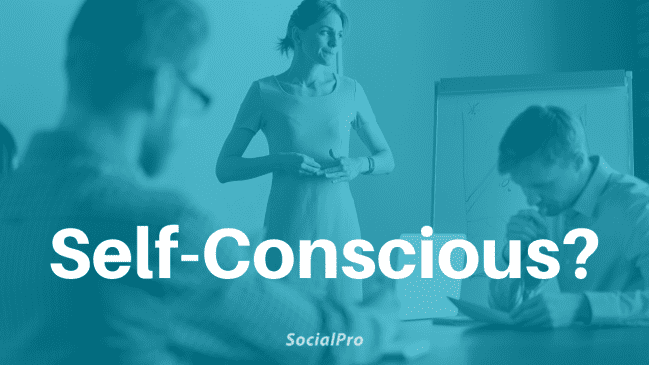





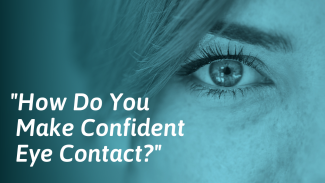
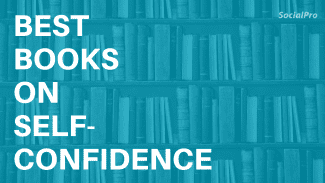
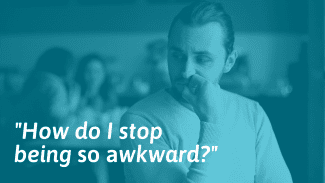
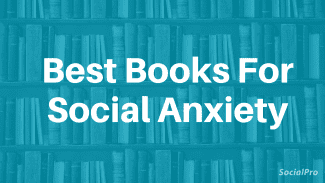
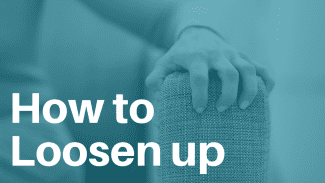
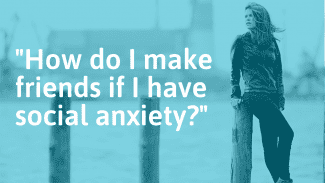
from where do i have to begin haha
I’m afraid of talking with strangers because i’m always overthinking my words and if i sound smart enough…sometimes i have the impression that everyone hates me. I’m afraid to eat in public places or infront of someone because i’m terrified of making weird eating noises or spill the food all over my clothes.
i feel ashamed of the way i look and i constantly feel like i don’t fit in because of all the beauty stabdards .
I’m afraid of being judged for the prices of things I use, content I consume, language I speak, etc. In my city, super poor and super rich people live alongside and for a poor kid like me, it’s hard not to get intimidated by the rich kids since their language/entertainment of choice/quality of things were always better those of mine.
Ever since I could remember I’ve always been a shy person, but as I have gotten older it has gotten worse, as to the point where socially settings make me sick, the thought about going out makes my stomache turn, like most that suffer from social anxiety, I can’t make small talk either, and like a few has mentioned in their comments, I also worry what people might think of my facial expressions if I come across as genuine or not. I also have the “odd” nervous walk when I go out. I can go on and on… it’s paralyzing. English isn’t my first language, hope I make sense.
Well..
For me, talking to others completely freaks me out. I find myself startling and end up talking for a shorter time than I planned to. It’s like the words flee from my mind and I’m just speechless. The fear of being judged, making errors and maybe not being as cool as my comrades/colleagues are really nerve wracking. A lot of persons would always appreciate my voice and articulation but the ANXIETY, FEAR is still present. I really need help.
I’m terrified everyday at work. Being around so many people is hugely nerve-wracking and I don’t think my coworkers like me.
I am afraid of people judging me for my body and the way it looks. I used to swim competitively for a pretty long time and hence have very broad shoulders. After quitting swimming though, I have started to gain a lot of weight and now I feel very insecure about my body and am always worried that people would judge me and say my body looks “masculine” or that I look “fat and bulky”. I am also afraid of losing friends as I’ve always been very easily replaced by my friends when someone supposedly better comes along.
I am afraid that I am going to say something stupid or that I am going to do something dumb. So instead I just awkwardly sit there quietly.
I often feel like I’m not good enough, and that my peers have some sort of an edge that I don’t.
I am afraid that I will say the wrong thing and people think that I am rude when I really don’t intend to be and I always used to stay quiet in social situations. Even I do say something, I will think twice and sometimes it gives me anxiety because I feel like people will judge me for what I say that I don’t sound smart or I am being rude which makes me think that I am.
This situation describes me to a T. I’m so ridiculously afraid of confrontation that I constantly worry I will say the wrong thing and offend somebody. It often prevents me from engaging in meaningful conversations with people. I find that I need to plan out the perfect way to word things and plan out all the possible ways somebody might respond. If I don’t, I totally freeze!
l have only one friend we don’t really spend that much time together and l am afraid that she doesn’t really want to spend time with me and the only thing that bothers me is she can hang out with other people instead of me and what l am afraid of is one day she doesn’t want to hang with me
l am not really good with social Interaction like l can’t go and talk to the people that work at stores or go to the counter by myself to pay for my food l don’t want to pay the wrong amount.
in group social interactions l can’t talk to people their l gets nervous l don’t want to say the wrong thing for them to not like me.
I feel this. I only talk to people on the internet and I’m afraid to talk to any stranger in real life. I feel like they’ll hate me if I talk to them and I say something weird.
I’m afraid that people are gonna think I’m stupid if I ask too many questions. And I am afraid that I’m gonna get judged for liking different things than everyone else.
I’m afraid of being judged as an idiot everywhere I go because I’m not what people want me to be.
When I am around people, I always try to act the best I could, I talk not too much, gently and the words I used were casual, I make sure I don’t smell and my cloth was neat. I was being polite. But for some reason, the people just don’t feel comfortable with me and I felt that they want to leave quickly and it really felt that they don’t want to be with me so I was dejected. So I try to be not so polite, I talk naturally, not sound too gentle, and I do make eye contact when I talk. But then I still felt not included and was just a stranger that try to make friends awkwardly. The way people look at me always makes me overthink. I felt that they don’t want me to be there. After some time I start thinking, is it my voice? or is it my look and my face? or the way I look at people? Or maybe it’s my behavior? Or I just don’t know that I am not supposed to be there? Or do they just have a bad impression on me from the start? because I do always say something weird and stutter sometimes. I do always act so nervous sometimes. So in the end, I start to isolate myself whenever I am around people and only come or talk when they call me or ask me anything as that is the only way I felt wanted. After a long time, I always felt awkward when I am around people and felt that they all hated me, at some point, I get so overwhelmed that I cry. I miss my old self that can talk and do whatever I want without feeling judged and was happy. I was once an extrovert but all the bad experiences I get for talking too much and doing something so confident but people were actually mocking gives me social anxiety.
It sounds just like what I used to be. But I have also noted that it happens only with people whom I don’t meet much often. The ones who have a give and take relationship with me don’t ignore me much and I am much more confident when I deal with these kinda people.
I very strongly feel that people always like and be around people for their own benefit. And this has made me a person with an “I don’t care” attitude.
So be yourself and don’t seek others’ validation. Stay happy and stay beautiful from the inside out.
May God Bless You.
I can empathize in your situation. Everything you have stated I’ve experienced first hand. My only wish for you is that you realize that you are not alone in this we all are here for you.
I can relate to this a lot. Trying so hard to be interesting and liked in social interactions, only to feel dejected by their unapproving gaze. In some cases, they are nicer and make you feel okay but clearly have no further interest to try and be friends. Over time being left out all the time made me an anxious introvert.
I’m just confused cause, I had this one friend and we started becoming pretty close but then one day she kinda just closed up and so I started to worry and get anxious so I did the same, and I know she still wants to be friend cause she’s told one of my aunts and she told me that so I think my friend is having the same problem as I am so I’m trying to figure everything out so I know how to talk to her……does anybody have any ideas on how to help me??
Hi Veronica, I guess open communication and just showing her/him your feelings and thoughts might help to open up again.
When I get to school, I get very anxious about how I look and worry that people are perceiving everything I notice in myself and hate about myself. That my thoughts are too complex, obscure. That I’m too closed, too observant since I like enjoying every little detail in everything I do or feel. A girl I had a romantic interest once called me “Paranoic” and most people (especially girls) I ever tried starting having a conversation with treated me with indifference. My mind tells me that if these things already happened, why can’t it happen again? And that really makes me too anxious to try. That sucks because we live among people, I’m a sensitive person and am really trying to find some strong connections with others, so I can feel that my life is getting somewhere.
I’m afraid of people looking at me and judging my appearance, seeing the flaws that I feel insecure about myself, also thinking I’m weird for being quiet and observant. I’ve always been self-reserved since my childhood.
I am afraid of people thinking that I am a bad or incapable person. This causes me to behave very awkwardly and inauthenticly.
I grew up poor and felt judged. I still feel it at age 60 even though I’ve been successful in my career.
I’m afraid from people judging my intelligence because I am always considered being the “perfect” and “smartest” child in the family.
I fear to be myself cause I fear my friends won’t like me that way and I am afraid to lose them. I am also afraid I will never find true love.
I feel like people might not like me for what I say or do, so I try to remodel myself according to what I think they like. I laugh at jokes I don’t really think are funny, or I make fun of others when I don’t really want to. I feel like if people do get to know me, they might not like the real me at all. I’m afraid ill do or say something wrong, and they won’t want anything to do with me anymore, because when you’re trying to socialize, but when you get the silent message you’re not wanted amongst the group, is the worst part of it all.
Hi Anavi, You are not alone! Your comment struck a cord with me as I feel the same. I’m always afraid people will not like the real me and mask my behavior to what I think they want. I’m sure you have much to offer, just like me. I hope you find people who appreciate you for who you are x
I get anxious when I’m at school and I’m scared to show vulnerability and my real emotions so I say more scripted things instead of my real emotions
I prefer to stay quiet in social situations, in hopes they forget I’m there, because usually if I speak I feel like I over-share, over-explain myself when asked a question. afraid I say the wrong thing and they won’t want anything to do with me anymore.
I feel overly aware of how I look every time I walk into a room of strangers. Even if I’m just crossing the room to get to my friends at the other end, I feel as if I’m being tracked and judged on my appearance.
I am very conscious of my features. Having been told from a young age that I look unusual, people either call me exotic or an ugly duckling and this social perception remains with me even today.
I am generally very happy to make friends and meet new people but something about the silence around strangers unnerves me. I feel ugly and yet desperately trying to earn their approval, validation of my looks and disposition is something I both fear and look forward to during those moments.
Like others I’m afraid of how I look, I’m my hair isn’t messy, my clothing matches from top to bottom, do I look fat in some shirts? Do I look skinnier I different? Does this color matches my skin tone…? And many others can relate and personally, this is something I deal with every single day and I wish I could just love myself and feel confident.
I’m generally afraid of how others see me, whether I’m dressed correctly or if I am saying the right thing or even using the right words or tenses. I feel everyone judges me and my actions and that’s why I am scared of going out or meeting other people.
Same here… you’re not alone. I haven’t been out for a while.
I am bothered whenever I say something/talk in a group of people and all of them turn and look at me. I feel better talking while they are actually not looking at me.
I worry I give off the wrong impression, and people might think that I don’t like them.
I have the same problem sadly …
I am afraid that I am not interesting enough for the people to like having conversations with me.
I am afraid that I accept people in my life that hurt me on purpose
Same here! I’m trying to carve out some time for hobbies and find some people who share my interests so we can have something in common and I don’t have to settle for people who don’t actually cherish me.
I’m afraid that people will judge me about how I look. Like I have puffy eyes and people saying I’m a weed smoker and some call me Satanist just because I have red eyes and I don’t feel comfortable when I’m around people and I feel ashamed of myself.
You should not feel ashamed of how you look.If you had a sleepless night or any other problems they would not know.
I too have puffy eyes and lots of people tell me that i look older than my age,but i just don’t listen to them because they don’t know me.
Don’t listen to them!!
Looks don’t matter!
Focus on learning to take care of yourself by putting yourself first!
Thank you!
I’m afraid that people judge my expressions and interactions as “non-genuine” or fake. I don’t know why, but I am too self-conscious about my face when I smile or do something with it, and almost instantly question if I am giving the impression I want to give or not, making me stop doing whatever facial expression I was doing. I want to work on that, stop overthinking that much.